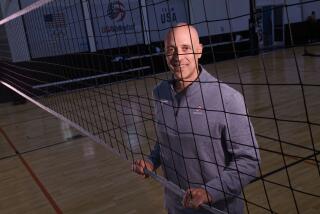Digging High-Level Detente in Orange County
- Share via
Stefan Mumaw is a 6-foot 8-inch junior who plays volleyball for University High School in Irvine. As one of the school’s tallest students, he enjoys the status of upperclassman.
But Friday morning, as one of the hosts to a 25-member volleyball delegation from the Soviet Union, he didn’t quite measure up.
There he was in the school’s quad, face to chin with Ivan Zagorski, one of the Soviets who will participate Sunday night in exhibition matches against U.S. Olympians and All-Americans. The site has been switched from Marina High to University.
This little cultural exchange ensued:
“Hey, how tall are you?”
“Almost 2 1/2 meters.”
“So, how tall is that?”
Zagorski stands almost 7-feet tall, and though Mumaw could not figure the conversion, he knew when he had met his match.
“I’ve really learned a lot about relationships between people,” Mumaw, 17, said. “There is no such thing as a stereotype.”
Last week, the Soviet gymnastics team was on tour of the United States. In the past six months, the country has been Sovietized with musicians--even rock ‘n’ roll musicians--the ballet and, now, as the 1988 Summer Games approach, athletes.
The schism that split international sport four years ago, when Moscow announced its Soviet bloc boycott of the 1984 Los Angeles Games, is all but forgotten in the name of the Gorbachev revolution.
With glasnost (openness) and perestroika (restructuring) more popular these days among Western political analysts than vodka and caviar, a transformation of good will has overcome the superpowers.
This intoxicating feeling was evident on a less grandiose, but equally important, scale Friday in Orange County, where the Soviet delegation is spending five days of a two-week tour. The delegation will leave Monday for Seattle, where the tour will end.
The delegation is composed of men and women volleyball players and officials of the Soviet Trade Union, which is sponsoring the group. Some of the athletes, such as Inna Ryskal, are famous Soviet Olympians. Others are promising young players who hope someday to wear the red CCCP uniforms at international competitions.
They are not the players who will be on stage at Seoul, South Korea, next fall for the Summer Olympics, said Gennady Shibaev, the delegation leader. Shibaev is president of the Soviet Trade Union, which played host to a U.S. volleyball entourage last year.
Shibaev said tours such as his are important for the development of Soviet volleyball.
“The American men are the best in the world,” he said through Vladimir Gheskim, a Soviet sports journalist who is acting as an interpreter for the delegation. “To know how volleyball is developed in this country is a necessary thing.”
The Soviets, however, were considered the world’s strongest men’s team until 1984, when the U.S. team won the Olympic gold medal. Although the Soviets did not compete, the United States had dominated the Soviets during a spring tour of the Soviet Union. The U.S. team, in fact, was playing against the Soviet national team in Kharkov on May 7, 1984, when the boycott was announced.
The U.S. team also won the 1988 world championships in spite of the Soviets’ participation.
But Valerie dePourtales, a member of American Volleyball, the Orange County-based organization hosting the Soviets, said she was impressed with the Soviet programs when she visited there last summer.
“They are so developed and organized,” she said during a barbecue-style lunch of hamburgers and hot dogs at University’s horticulture center. “We tend to walk into a gym and think, ‘Now we’ll have a good time.’ They walk in and it’s all business and they know by excelling that they’ll have a good time.”
But none of the Soviets seemed concerned with their volleyball technique as they toured University High. They were taken to a gym class, a computer class and a lunchtime concert with a live rock band.
They showed polite interest at the physical education class, where teen-agers were attempting to play volleyball with minimal skill.
The computer class, however, provided special excitement as they clustered around students to watch them work their keyboards.
“It’s great to see how they react with computers,” Mumaw said. “I’ve been around computers all my life.”
But it was his first exposure to Soviets.
Now he hopes it’s not his last.


